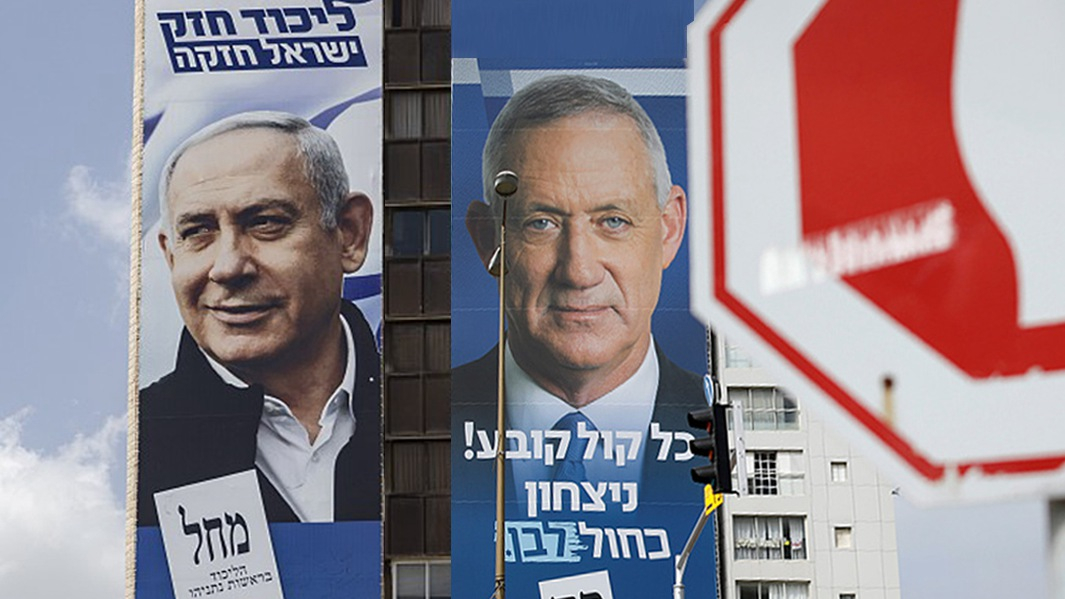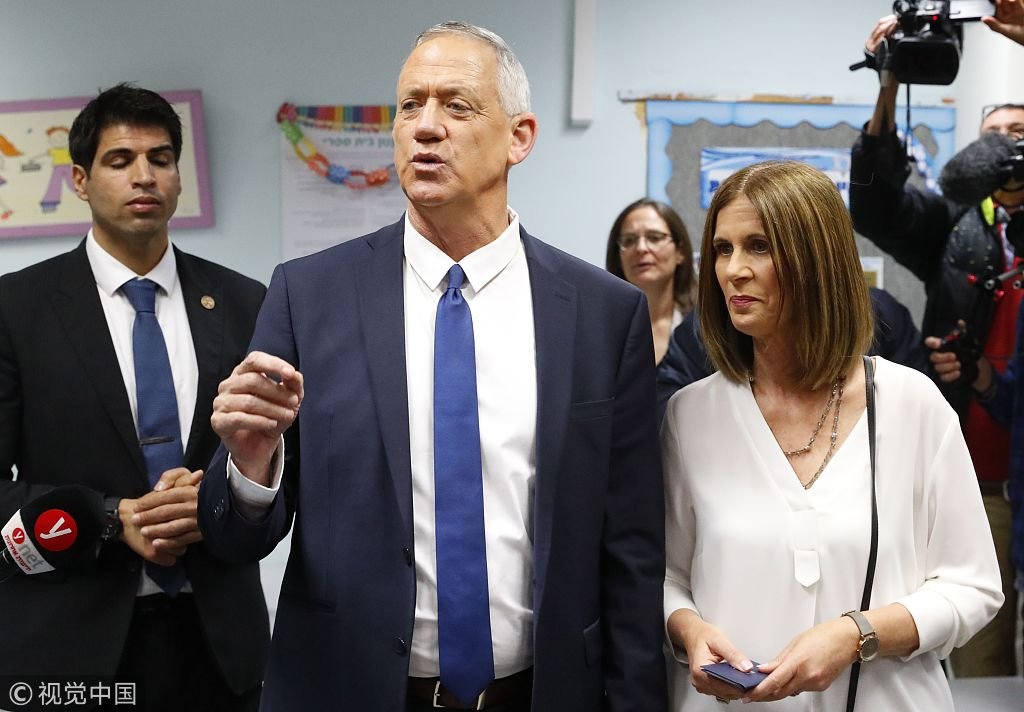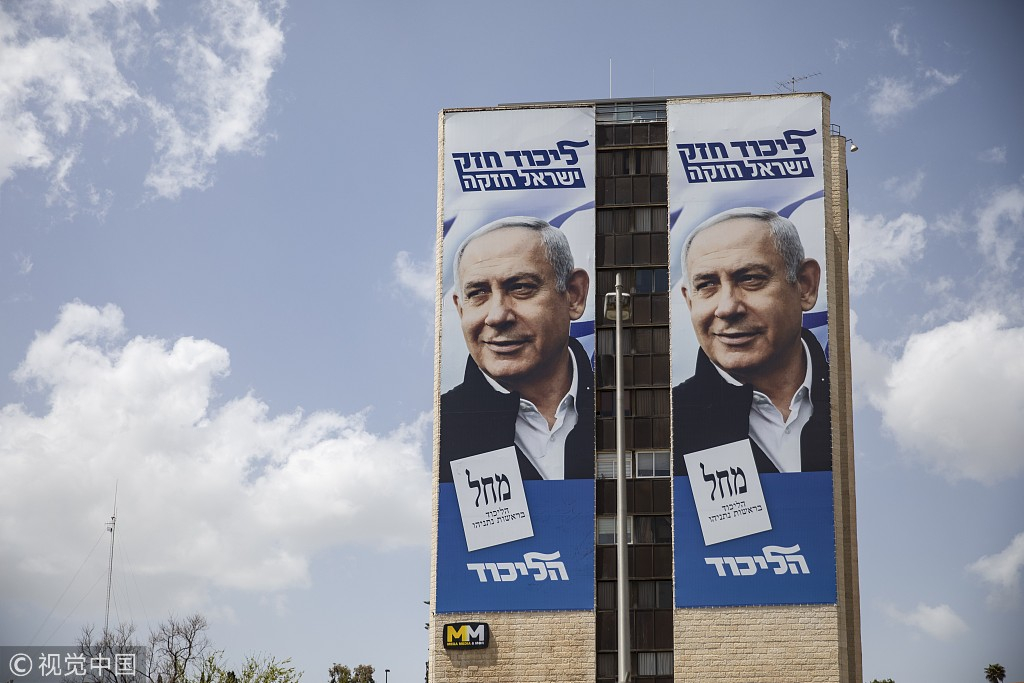
Opinion
21:18, 09-Apr-2019
Israeli Election, between 'King' and 'Prince'
Updated
10:59, 10-Apr-2019
Wang Jin

Editor's note: Wang Jin is a PhD graduate from the School of Political Sciences at the University of Haifa of Israel, and a research fellow at Charhar Institute in China. The article reflects the author's opinion, and not necessarily the views of CGTN.
Israelis are voting today on the general elections that could be said as the most competitive one in years. The current Prime Minister Benjamin Netanyahu who has been serving for 10 years faces pressing challenges from former military chief Benny Gantz, leader of the Blue and White alliance.
Given the U.S. President Donald Trump's recent controversial announcement over Golan Heights and the possible stepdown of Netanyahu, this election is being closely watched by international society given its possible influence over the Middle East peace process.

Retired Israeli General Benny Gantz, one of the leaders of the Blue and White (Kahol Lavan) political alliance, and his wife Revital, prepare to cast their votes during Israel's parliamentary elections in Rosh Haayin, April 9, 2019. /VCG Photo
Retired Israeli General Benny Gantz, one of the leaders of the Blue and White (Kahol Lavan) political alliance, and his wife Revital, prepare to cast their votes during Israel's parliamentary elections in Rosh Haayin, April 9, 2019. /VCG Photo
From 1996 to 1999, and from 2009 to 2019, Benjamin Netanyahu has occupied the post of Israeli prime minister for 13 years, and this makes him the second-longest prime minister in modern Israel, only next to the founding Israeli prime minister David Ben Gurion.
During the past 10 years, Netanyahu witnessed the declines of his different political opponents, including Ehud Barack from the left-wing Labor Party, the Ariel Sharon inside the Likud Party, Ehud Olmer and Tzipi Livni from Central-Right wing Kadima.
After years of intensive political competition, Netanyahu still stands at the highest point inside Israeli political arena.
In this election, Netanyahu encounters the most pressing challenge in recent years. The "Blue and White" party unlike other Netanyahu's political opponents such as Avi Gabbay from left-wing Labor party and Naftali Bennet from the right wing "Habayit Heyahudi" (Jewish Home) party that lack necessary security and military experience, the "Blue and White" alliance led by Former Military Chief Benny Gantz have the possibility of bringing security to Israeli public and may attract supports from right-wing voters in Israel society.
As he has served the post of prime minister for years, some Israelis even call Netanyahu as "King Bibi." Meanwhile, as an important military figure who directed and commanded military offensives against Gaza in 2014, Benny Gantz also earns the nickname of "prince".
According to the poll before the election, the future prime minister would most likely go to Benny Gantz or Netanyahu, therefore this election could be described as an election between "King" and "Prince."

Posters for Israeli Prime Minister Benjamin Netanyahu are found on a building before the early general elections in Jerusalem, April 9, 2019. /VCG Photo
Posters for Israeli Prime Minister Benjamin Netanyahu are found on a building before the early general elections in Jerusalem, April 9, 2019. /VCG Photo
Both Gantz and Netanyahu try to, on the one hand, describe himself as the "only one" for Israeli voters, while on the other hand discredits others.
Netanyahu labels Gantz as "leftist" due to the close connection between Gantz's wife and some Israeli left-wing social groups, and maintains that Gantz is not able to bring security to Israeli public, while Gantz criticizes Netanyahu's corruption charges and believes that Netanyahu's leadership in Israel is too long and "it is time for a change."
However, whether it's the "King" or "Prince," the kingdom will remain. This election is nothing but inter-party competition. No economic and social issues are highlighted. No ideological divisions are highlighted. Whether it's Netanyahu or Gantz, Israeli foreign policy is likely to remain unchanged. Israeli society worries the expanding influence of Iran, which is perceived by Israel as a vital enemy, in Syria and Lebanon.
There is also the worry of rockets fired from Hamas-controlled Gaza Strip to Israel territory. Jerusalem is still perceived as an "undivided capital" for Israel, and the Jewish settlements in the West Bank and Golan Heights are still very sensitive issues inside Israeli society.
Unless there are some major power changes in the Middle East region, there would be no significant difference between Netanyahu and Gantz over the future of Israeli foreign policy.
(If you want to contribute and have specific expertise, please contact us at opinions@cgtn.com.)

SITEMAP
Copyright © 2018 CGTN. Beijing ICP prepared NO.16065310-3
Copyright © 2018 CGTN. Beijing ICP prepared NO.16065310-3